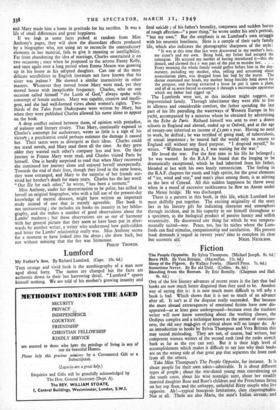Lumford
My Father's Son. By Richard Lumford. (Cape. 10s. 6d.)
THIS strange and vivid book is the autobiography of a man now aged about forty. The names are changed but the facts are authentic down to their last harrowing detail. " Lumford " spares himself nothing. We are told of his mother's growing insanity and
final suicide ; of his father's brutality, coarseness and sudden bursts of rough affection—" a poor thing," he wrote under his son's portrait, " but my own." But the emphasis is on Lumford's own struggle with his neurotic loneliness. Here is a sample of their early family life, which also indicates the photographic sharpness of the style:
" It was at this time that lice were discovered in my mother's hair, my sister's and my own. Being bald, my father had escaped the contagion. He accused my mother of having introduced it—this she denied, and claimed thLt i. was part of the plot to murder her. . . . Every morning the whole family would gather before him in the day- nursery, including my mother, who, yelling and screaming about assassination plots, was dragged from her bed by the nurse. The doctor examined our heads, my mother being forcibly held down for the purpose, and having extracted a louse he put it upon a plate, and all of us were forced to examine it through a microscope apparatus which my father had rigged up."
The Lumfords were not, as this incident might suggest, an impoverished family. Through inheritance they were able to live in idleness and considerable comfort, the father spending the last part of his life patrolling the waterways of Western Europe in his yacht, accompanied by a mistress whom he obtained by advertising in the Echo de Paris. Richard himself was sent to over a dozen schools in England and abroad, ended up at Oxford, and at the age of twenty-one inherited an income of Lz,000 a year. Having no need to work, he drifted ; he was terrified of going mad, of tuberculosis, of sexual impotence ; he toured half the world only to return to England still without any fixed purpose. " I despised myself," he writes. " Without knowing it, I was waiting for the war."
He loved the war. For the first time in his life he belonged • he was wanted. In the R.A.F. he found that the longing to be dramatically exceptional, which he had inherited from his father, blended at last with his own lonely romanticism. The feeling in the R.A.F. chapters for youth and high spirits, for the great elements of " ice, wind and star," and man's place among them, is as stirring as the i3est of Conrad. All this sudden happiness he threw away when in a mood of excessive recklessness he flew an Anson under the Menai bridge. He was discharged.
There is a pattern in this book, in this life, which Lumford has most skilfully put together. The exciting originality of the story lies in his literary gift for indicating character and atmosphere through incident, and in his capacity to see himself throughout as a specimen, as the biological product of passive lunacy and selfish eccentricity. He discovered one thing for which he was tempera- mentally suited—war. Peace, too, has its niches where the Lum- fords can find stimulus, companionship and satisfaction. His present book demands a sequel in twenty years' time to complete its clear






































 Previous page
Previous page